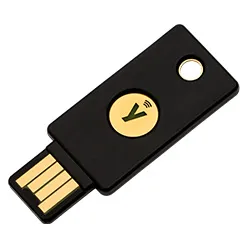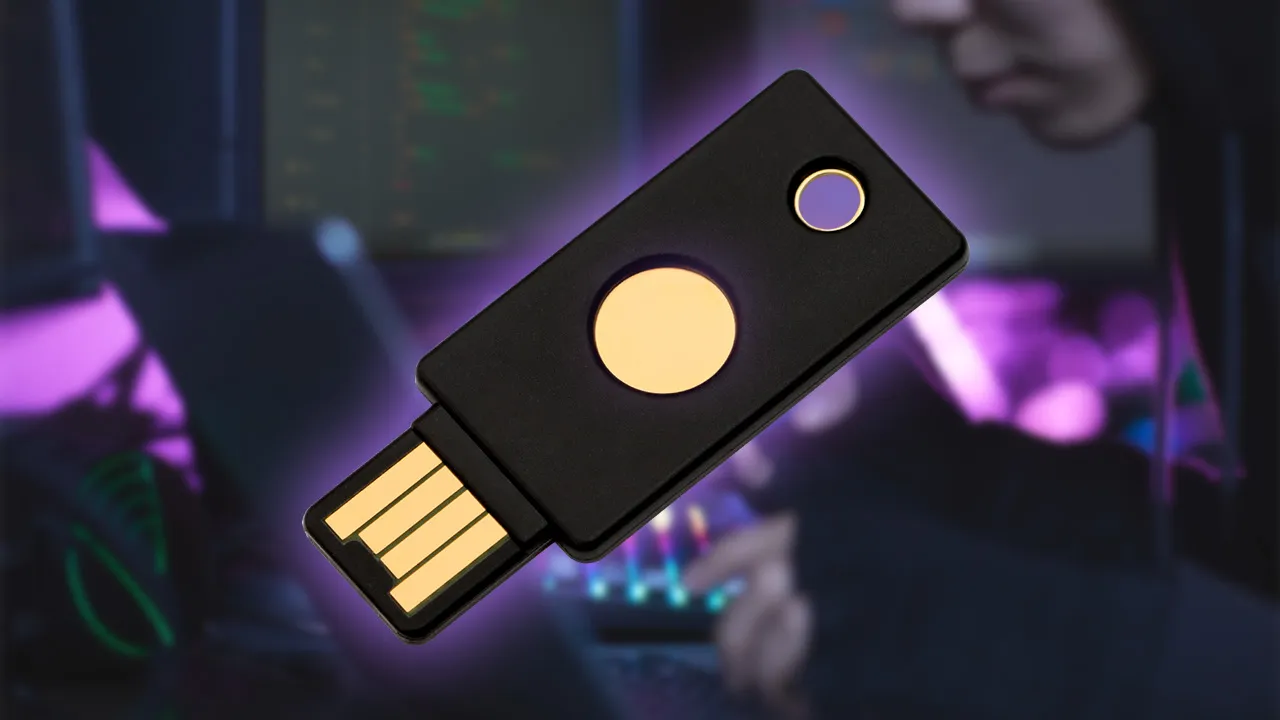I know what you may be thinking. What the hell is a multifactor security key and why in gods name should I use it? Well, it’s cybersecurity at your fingertips. Here is a breakdown of WTF it is.
What is a multifactor security key?
A multifactor security key is a physical device that is used to provide an extra layer of security to online accounts. Unlike a traditional password, which can be easily guessed or stolen, a multifactor security key requires a user to have both the key and a password to access an account. This means that even if a password is compromised, an attacker will not be able to access the account without the physical key. Take that, you asshole scammers.
Multifactor security keys typically work by using two-factor authentication, which requires the user to provide two forms of identification. In this case, the first form of identification is the password, and the second is the physical security key. When the user attempts to log into an account, they are prompted to insert the security key into their device, which then verifies their identity.
Multifactor security keys come in different forms, including USB keys, NFC (near-field communication) keys, and Bluetooth keys. They can be used to secure a variety of online accounts, including email, cloud storage, and financial accounts. By adding an extra layer of security to these accounts, multifactor security keys help to protect against unauthorized access, hacking, and phishing attacks. A brilliant concept to be honest. Just don’t lose the damn thing.
The key importance of using a multifactor security key
- Enhanced Security: A multifactor security key provides an extra layer of security that is much harder to bypass than a traditional password. Even if a password is stolen or guessed, an attacker will still not be able to access the account without the physical security key. Basically giving a middle finger up to the would-be scammer/thief.
- Protection Against Cyber Threats: Cyber threats such as hacking and phishing attacks are becoming increasingly common. By using a multifactor security key, individuals can protect their online accounts from these threats and reduce the risk of their personal and sensitive information being compromised. Another middle finger.
- Prevention of Unauthorized Access: A multifactor security key helps prevent unauthorized access to online accounts. This is especially important for sensitive accounts such as financial and health records.
- Compliance with Security Standards: Many industries and organizations have security standards that require the use of multi-factor authentication. By using a multifactor security key, individuals and organizations can comply with these standards and ensure that their accounts are protected.
- Peace of Mind: Using a multifactor security key provides peace of mind by knowing that your online accounts are protected against cyber threats.
So basically, if you want to say “fuck you” to a scammer trying to get into your personal accounts, use a multifactor security key.
How does a multifactor security key work?
A multifactor security key works by using two-factor authentication, which requires the user to provide two forms of identification. The first form of identification is the password, and the second is the physical security key.
When the user attempts to log into an account, they are prompted to insert the security key into their device, which then verifies their identity. The security key typically communicates with the device via a USB port, NFC, or Bluetooth.
Once the security key is inserted or connected, the user is prompted to enter their password. The security key then generates a unique code, which is transmitted to the device. The device then compares this code to the one stored in the user’s account to verify their identity.
If the codes match, the user is granted access to the account. If not, the user is prompted to try again. This process ensures that even if a password is stolen or guessed, an attacker will not be able to access the account without the physical security key.
Overall, the use of a multifactor security key provides an extra layer of security that helps to protect against unauthorized access, hacking, and phishing attacks. By using a multifactor security key, individuals and organizations can enhance the security of their online accounts and reduce the risk of their personal and sensitive information being compromised.
What types of security keys are available?
- USB Keys: USB keys are the most common type of security key. They are small devices that are plugged into a USB port on the user’s device. When the user attempts to log into an account, they are prompted to insert the USB key, which then verifies their identity.
- NFC Keys: NFC keys use near-field communication technology to communicate with the user’s device. The user simply taps the NFC key to the device, which then verifies their identity.
- Bluetooth Keys: Bluetooth keys use Bluetooth technology to communicate with the user’s device. The user can simply press a button on the Bluetooth key to verify their identity.
- Smartcard Keys: Smartcard keys are similar to USB keys but use smartcard technology instead of USB. They are inserted into a smartcard reader, which then verifies the user’s identity.
- Biometric Keys: Biometric keys use biometric technologies such as fingerprints or facial recognition to verify the user’s identity. The user simply places their finger or face in front of the biometric key, which then verifies their identity.
Each type of security key has its own advantages and disadvantages, and the best type for a particular user will depend on their individual needs and preferences. For example, USB keys are the most widely supported, but NFC keys are more convenient for mobile devices. Bluetooth keys are the most flexible but require a compatible device and a Bluetooth connection.
Ultimately, the choice of a multifactor security key will depend on the user’s specific needs and requirements, as well as their device compatibility and security standards. As mentioned above, USB and NFC keys are the most commonly used products out there since they are compatible with just about everything.
The comparison to other authentication methods
Multifactor security keys provide a higher level of security compared to other authentication methods such as passwords or single-factor authentication for obvious reasons.
Passwords are vulnerable to hacking, cracking, and phishing attacks, as well as being easily forgotten or lost. In contrast, multifactor security keys provide a physical form of identification that is much harder to steal or replicate.
Single-factor authentication, which only requires a password, is less secure than multifactor authentication because it relies solely on something that the user knows. If a password is stolen or guessed, the attacker can easily access the user’s accounts. Here is looking at you sticky note password people.
In comparison, multifactor security keys provide an additional layer of security that makes it much more difficult for an attacker to access the user’s accounts. Even if the attacker knows the user’s password, they will still need the physical security key to log in. You guessed it, middle finger to the attacker.
Multifactor security keys also provide an additional level of trust and assurance, as they are typically certified by industry standards and undergo rigorous testing to ensure their security and reliability.
So what have you learned so far? Multifactor security keys provide a more secure and convenient form of authentication compared to passwords or single-factor authentication. By using a multifactor security key, individuals and organizations can enhance the security of their online accounts and reduce the risk of their personal and sensitive information being compromised. Simple as that.
Why you should use a multifactor security key
Cyber threats are a big one.
Cyber threats and vulnerabilities refer to the various types of malicious online activities that can compromise the security of individuals and organizations. These include hacking, phishing, malware, ransomware, and other types of cyber attacks.
Hacking refers to unauthorized access to a computer system or network, which can result in the theft or loss of sensitive information. This can be done through various means, such as exploiting software vulnerabilities, guessing passwords, or using social engineering tactics.
Phishing is a type of social engineering attack that involves tricking the user into providing sensitive information, such as passwords or credit card numbers. This is typically done through fake emails or websites that appear to be from a legitimate source, but are actually designed to steal the user’s information.
Malware refers to any software that is intentionally designed to cause harm to a computer system or network. This includes viruses, Trojans, spyware, and other types of malicious software.
Ransomware is a type of malware that encrypts the user’s files and demands payment in exchange for the decryption key. This can result in the loss of sensitive information and the disruption of normal business operations.
These cyber threats and vulnerabilities can result in serious consequences for individuals and organizations, including financial losses, identity theft, and reputational damage. To protect against these threats, it is important to use strong passwords, keep software and security systems up-to-date, and be aware of the signs of phishing and other types of cyber attacks.
Basically, the role of multifactor security keys is to prevent hacking and phishing attacks that can make you lose your shit. They block an attacker, quickly and easily.
Choosing the right multifactor security key
Choosing the right multifactor security key can be a complex and challenging task. There are several factors that need to be considered to ensure that the right security key is chosen for the user’s needs.
The first factor to consider is compatibility. The user’s device, operating system, and web browser need to be compatible with the security key to ensure that it can be used effectively. It is important to check the compatibility of the security key before purchasing it.
The second factor to consider is the form factor of the security key. There are several form factors available, including USB keys, NFC keys, and Bluetooth keys. The user needs to choose the form factor that is most convenient for them, based on the devices they use and the environment in which they use them.
The third factor to consider is the level of security provided by the security key. Some security keys provide stronger security features than others, such as encryption and a tamper-resistant design. It is important to choose a security key that provides the level of security that the user needs to protect their personal and sensitive information.
The fourth factor to consider is the cost of the security key. The cost of security keys can vary greatly, from a few dollars to several hundred dollars. The user needs to choose a security key that fits within their budget and provides the level of security that they need.
Security key recommendation
I have been using the Youbikey 5 series for several months now. The Yubikey 5 NCF to be exact. It is a USB A and NFC key. There are other models that feature different connections like USB C, Bluetooth etc and have a range of cost. The 5 NFC is about $50 bucks while the USB C version is about $55 bucks. No matter which keys you buy, be sure to buy two(2) or more. You will want a backup in case you lose it. If you do and you did not get recovery codes from the services you set the key up with, your fucked. So, to reiterate, buy more than 1 key and get recovery codes when setting up two-factor security!
Now you know the importance that a multifactor security key can bring you. Now secure your shit!







